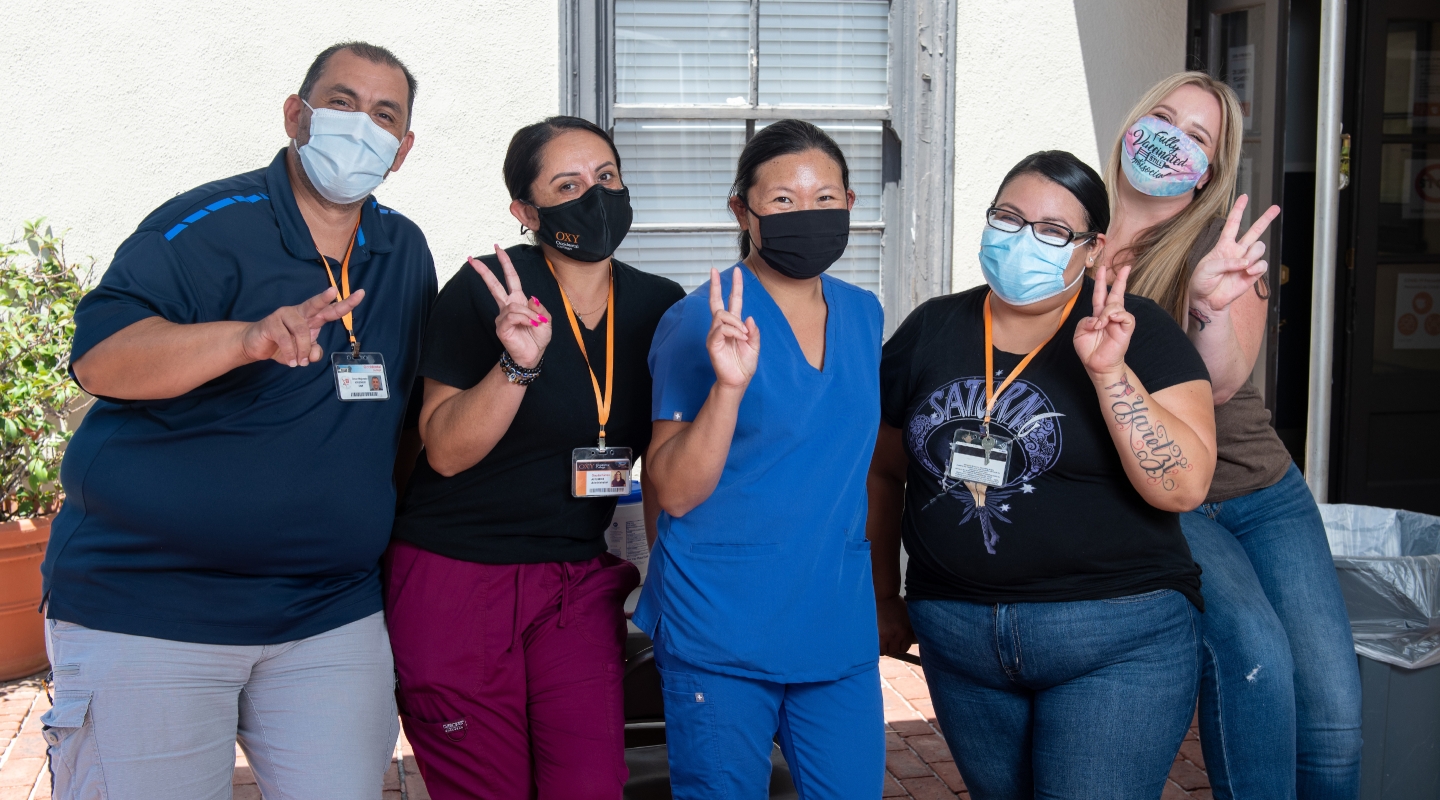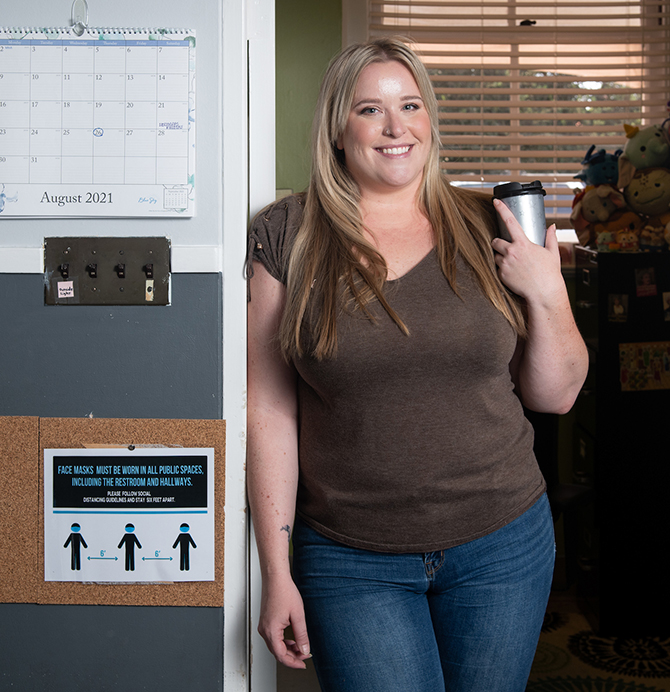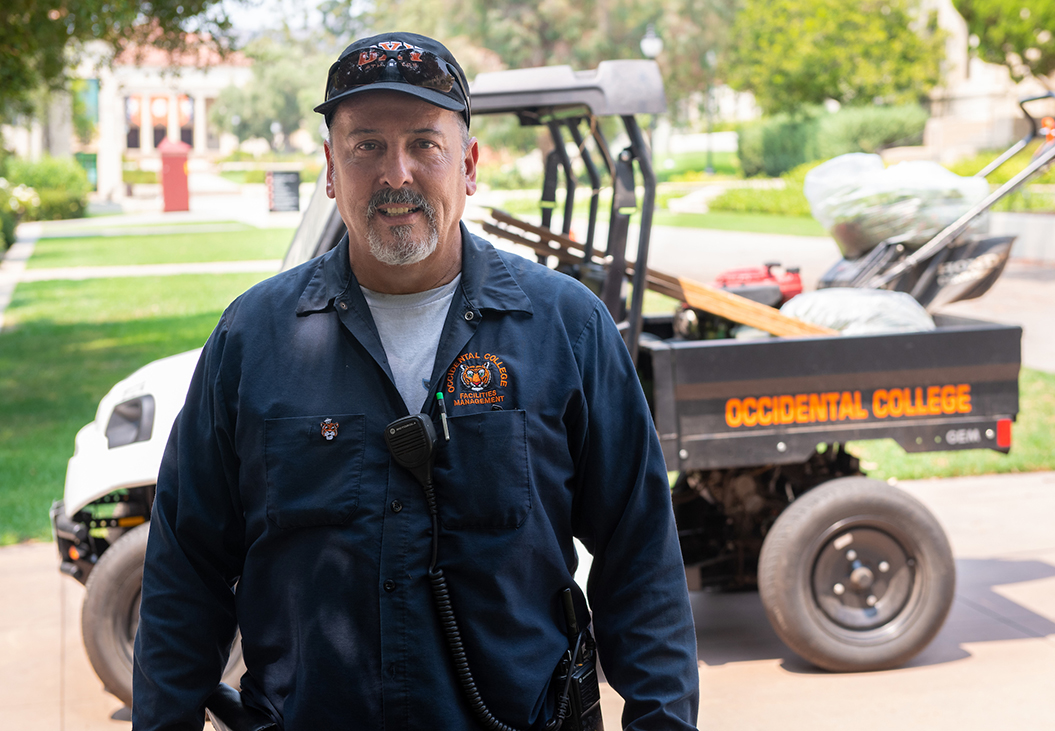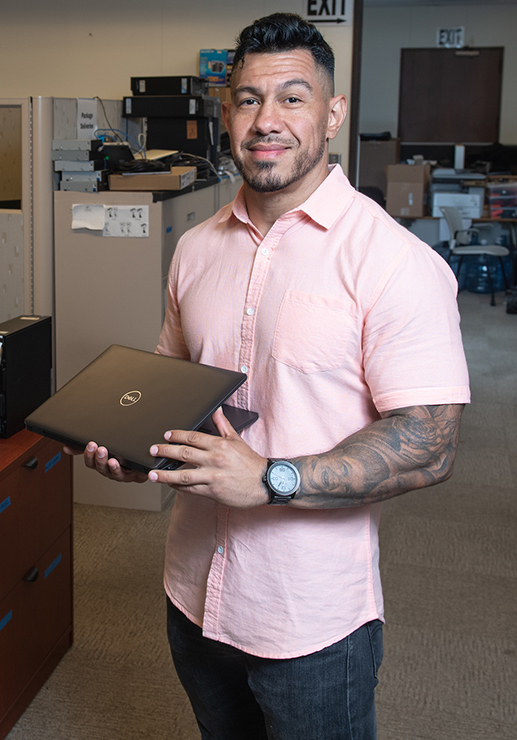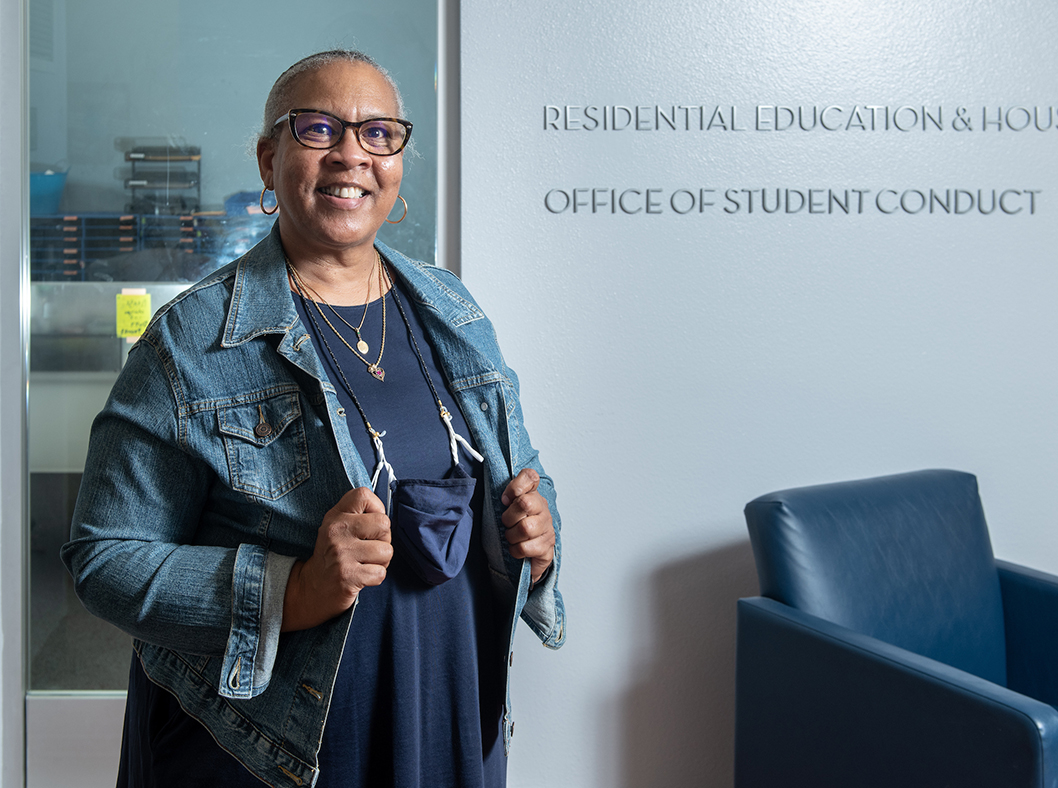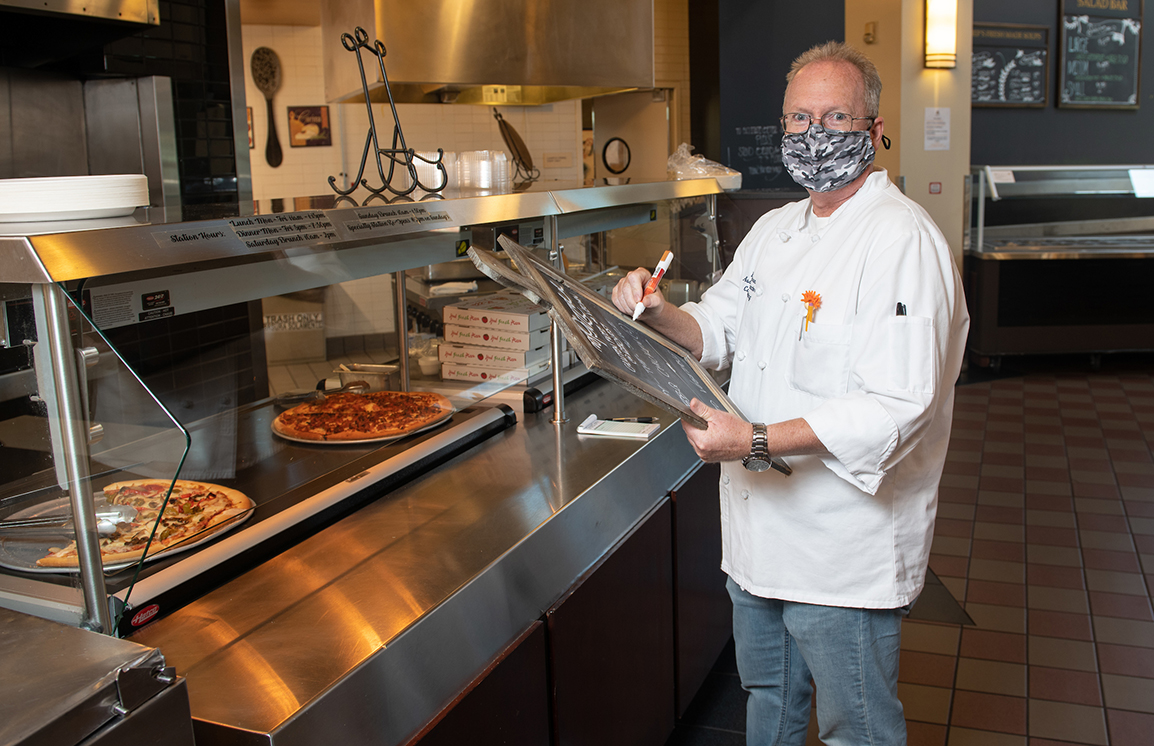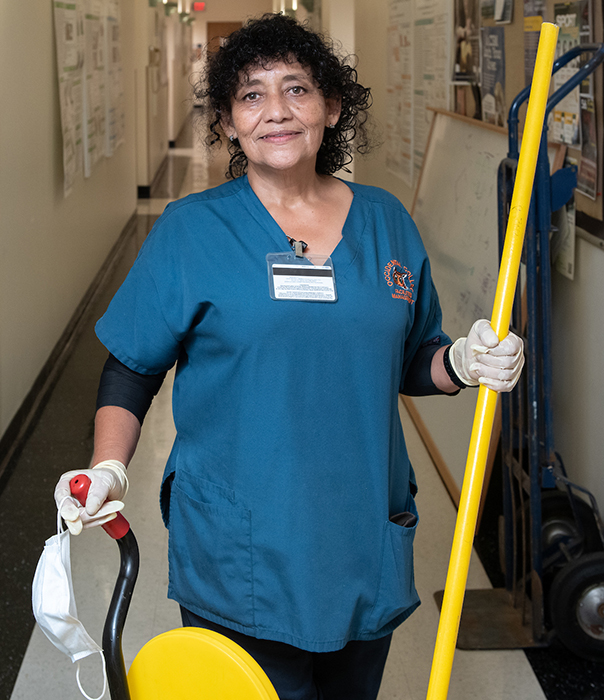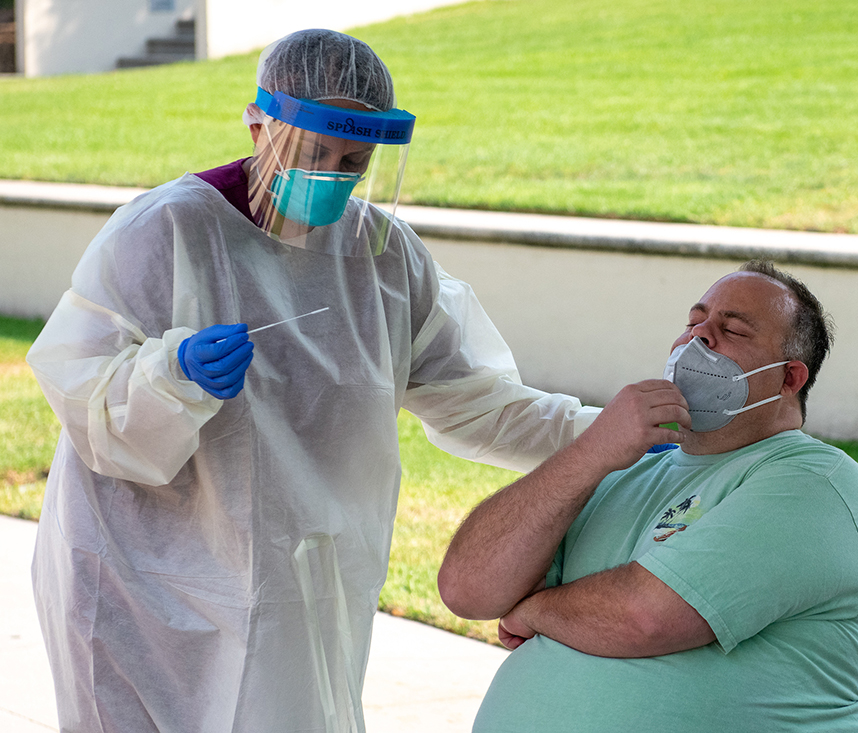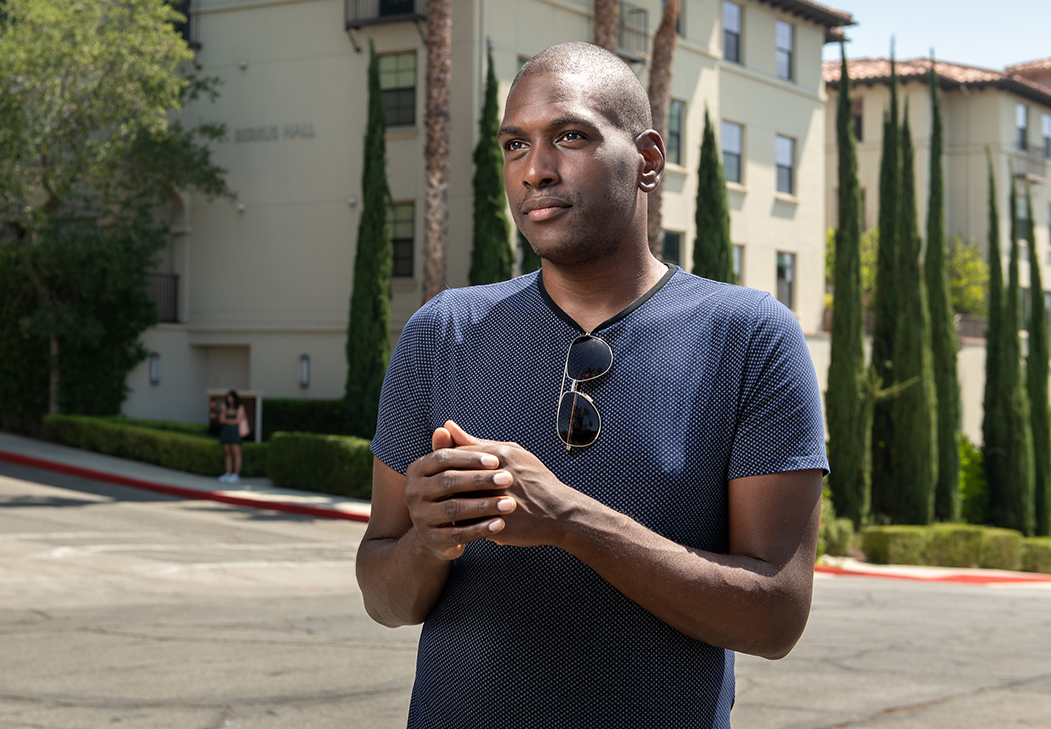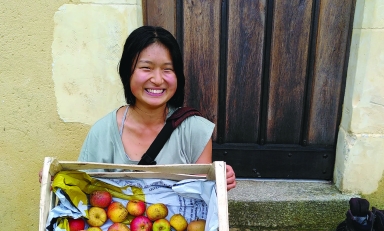From Dining Services to Residential Life, and Facilities to ITS, scores of dedicated people kept the College ticking throughout the pandemic
For the last 16 months, Krista Place has spent far too many of her working hours on hold. As Oxy’s student benefits and insurance specialist, Place works with insurers to make sure students get treatment for their medical and mental health needs. Under ordinary circumstances, that’s a relatively simple matter of dealing with local providers in Los Angeles and Pasadena.
As the pandemic moved classes, senior comps, and the rest of the academic experience online, hundreds of Oxy employees worked quietly behind the scenes, both at home and on campus, to keep the College running. A sprint to provide essential services soon became a marathon—one that required staff to draw on a mix of creativity, flexibility, empathy, and sheer doggedness to continue to make critical support services available in the face of constantly changing circumstances.
Place remembers days when, feeling overwhelmed and depressed, she didn’t want to come into work at Emmons. “Dealing with the stress of the pandemic on top of everything here was pretty difficult at times,” she says. “But it was nice having a team that knew what we were going through and made sure we took care of ourselves along with everyone else.”
Yet mingled with that strong sense of community and pride in the teamwork that pulled everyone through is an awareness of the toll the pandemic has taken. “It was a rough year, 2020,” says Michael Reyes, a member of the grounds crew in Facilities Management since 2017. “It wasn’t a good year for anybody.”
When Oxy switched to remote learning in March 2020, every department on campus coped with its own set of challenges. Information Technology Services grappled with how to provide hardware and software support remotely. In the Registrar’s Office, staff was faced with how to communicate important changes in academic policy to students while trying to digitize essential forms. Dining Services had to downsize and reconfigure its services to meet public health guidance while redesigning menus to use up existing supplies. Residential Education and Housing Services (REHS) had to figure out how to identify and verify students with hardship cases who could remain in campus housing and how to give other students a way to retrieve their belongings from their residence hall rooms.
Speed was of the essence at a time when everything took longer. “The way I have always operated is if something comes up, just walk out to the front office and say, ‘Hey, this is what’s going on and we need to get this squared away.’ That wasn’t possible when I had folks working in five different places,” says Registrar Jim Herr ’86. “Online, we’re remotely connecting to a secure database and software that you might not have the necessary bandwidth for if you’ve got two kids in school fighting for internet access.”
As the pandemic continued to spread, keeping the College running became an exercise in patience and flexibility as guidance from public health officials changed regularly. “Every time a new set of guidelines came out, it was OK, what do we need to do to comply?” says Robert Starec, associate director of campus dining and a 28-year Oxy veteran.
Regular trips to the post office to get laptops, headsets, webcams, ethernet adapters, and other hardware to students and faculty became routine for ITS staff, which has long prided itself on its personal service. “We almost became like postal carriers,” Orta says.
Staff also stepped up when pandemic-generated budget deficits led to 129 colleagues—26 percent of the College’s non-faculty workforce—being temporarily furloughed. (All other employees had their salaries frozen and were required to take up to three weeks of unpaid furlough.) “Basically, I have two gears, and when the pandemic hit, I had to shift into second gear,” Reyes says. “There was more work and fewer people because of furloughs. Some days were better than others, you know.” For Reyes, in addition to picking up trash, that meant pulling weeds, trimming trees, mowing sports fields—"whatever needed to be done to make the campus look nice.”
Because of the continuing uncertainty, planning for the future required the repeated development of multiple scenarios. At one point during the summer of 2020, when the possibility loomed of bringing students back in the fall, REHS staff made a field trip to inspect apartments in Pasadena that could be leased to provide housing for students who couldn’t be accommodated on campus under the strict social distancing requirements then in place. “Many times we had to create as many as five different scenarios, fully planned out, knowing that we were probably only going to use one,” says Isaiah Thomas, assistant dean of students and REHS director. “But you need to be prepared.”
Teamwork was a key to weathering the pandemic, whether it was Student Affairs working with the Registrar’s Office to publicize changes in academic policies or ITS working with Student Leadership, Involvement & Community Engagement to put on a year’s worth of virtual events, including a Springfest concert last April featuring Grammy nominee Phoebe Bridgers. “We were trying to see how we could keep programming as normal as possible, and we were able to duplicate almost every event virtually,” says Shaneice Warfield, assistant director of student involvement.
“I was lucky because our front desk person in Emmons, Omar Mejorado, used to work in insurance in his old job, and there were days when the requests were just massive, and I’d ask Omar, can you take half the list, you start at the bottom, I’ll start at the top, and we’ll meet somewhere in the middle,” Place says. “And he would do it. He’s amazing.”
Staff members’ matter-of-fact recounting of their pandemic work experience, with an occasional laugh at the memory of particularly challenging situations, often masks the emotional upheaval they experienced in dealing with their own fears and worrying about their families and loved ones.
“The biggest challenge was just dealing with the uncertainty,” Starec says. “Whether they continued to work throughout or whether they were on furlough, staff was stressed and anxious. Everyone was wondering how is this going to progress, how is this going to affect us moving forward and when are we going to be able to return to work?”
Cortes remembers getting into her car to drive to campus to start her 4 a.m.-to-12:30 p.m. cleaning shift and starting to worry. “Before the pandemic, I was not worrying about anything,” she says in Spanish. “But everything you heard about on the news about people getting sick, just thinking about that was scary. I was afraid of getting sick and bringing it home to my family. Even though I was taking precautions for herself, I didn’t know whether other people were doing the same thing.”
In Dining Services, Starec was diagnosed with COVID last December, one of just 13 staff cases to emerge on campus. “About a week in, the symptoms got so severe, I had trouble breathing, so I went into the emergency room. But they said that as long as I have adequate oxygen levels, I just had to ride it out,” the ex-Marine remembers, laughing. He was back on the job in early January.
For weeks after he got off work, ITS’ Orta was dropping off groceries and supplies at his parents’ house, where his mother, father, brother, and sister-in-law were all suffering from COVID. “My Mom and my sister-in-law work in the medical field, and I believe they got it through that,” he says. “Mom and Dad had to go to the hospital. It was really tough. They were in there for a few days and then after they came out, I was trying to make sure that they all got fed, and just making sure they were OK.”
Cortes and her colleagues who were out on furlough—in her case, a 50 percent furlough, working one week and out the next—were coping with other sources of anxiety. Dealing with the California Employment Development Department was a nightmare, she says, with unemployment benefit checks arriving late or not at all. “One week I was calling all day, every day, trying to reach someone who could help me,” she says. “I didn’t know how I was going to pay my bills.”
Despite it all, Cortes and other Oxy staff continued to show up for work. (All mandatory furloughs ended July 1, when Cortes returned to full-time work.) “I felt like I had to do my job to protect others,” Cortes says. “I had a social and a moral obligation to do my work and have everything clean.”
“It’s a testament to Oxy and the people who work here how much we were able to go through and still band together for the greater good,” Place says. “I don’t know if I’ve seen this any other place I’ve worked before.”

